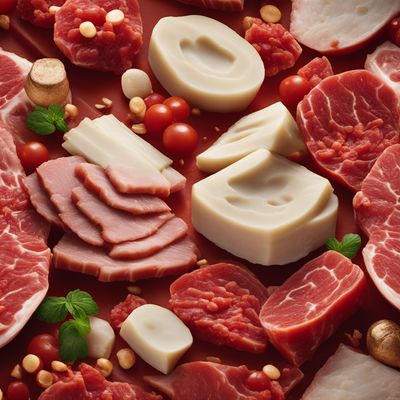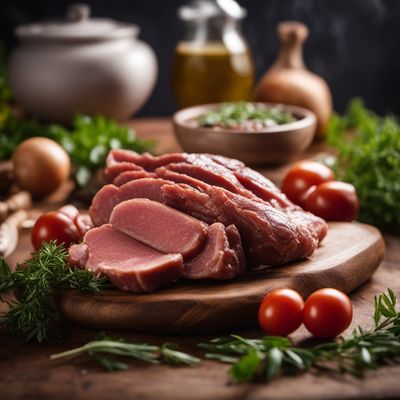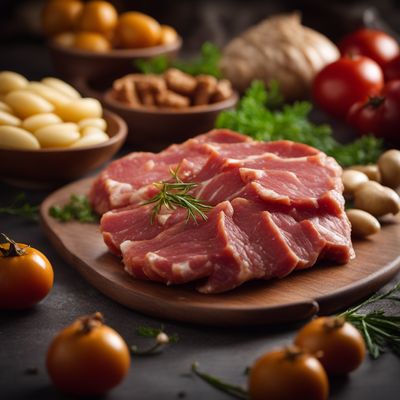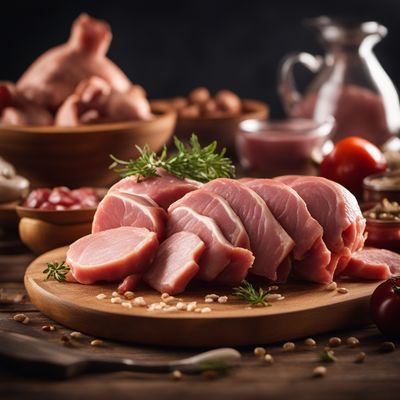
Ingredient
Mammals meat
The Savory Delight: Exploring the World of Mammals Meat
Mammals meat refers to the flesh of animals belonging to the class Mammalia, including but not limited to beef, pork, lamb, and venison. It is characterized by its tenderness, juiciness, and distinct flavor, which can vary depending on the specific animal and cut. Mammals meat is often marbled with fat, contributing to its succulence and enhancing the overall taste. It can range in color from pale pink to deep red, and its texture can vary from tender and melt-in-your-mouth to slightly chewy, depending on the cooking method and cut of meat used.
Origins and history
The consumption of mammals meat dates back thousands of years, with early humans hunting and gathering animals for sustenance. Over time, the domestication of animals such as cattle, pigs, and sheep led to the development of livestock farming, making mammals meat more readily available. Different cultures have their own traditions and preferences when it comes to mammals meat, with beef being highly regarded in Western cuisines, pork being a staple in many Asian cuisines, and lamb being favored in Middle Eastern and Mediterranean cuisines.
Nutritional information
Mammals meat is a valuable source of high-quality protein, essential amino acids, vitamins (such as B vitamins), and minerals (such as iron and zinc). It can provide varying amounts of fat, depending on the specific cut and cooking method. On average, a 3-ounce serving of lean beef contains approximately 180 calories, 22 grams of protein, and 10 grams of fat.
Allergens
Mammals meat may pose allergenic risks to individuals with specific allergies to beef, pork, lamb, or other mammalian meats.
How to select
When selecting mammals meat, look for cuts that are bright in color, firm to the touch, and have minimal odor. For beef, marbling is an indicator of tenderness and flavor. For pork, choose cuts with a pinkish hue and a small amount of fat for optimal juiciness. Lamb should have a bright red color and firm texture, while venison should be dark red and free from any off-putting odors.
Storage recommendations
To maintain the freshness and quality of mammals meat, it is best to store it in the refrigerator at temperatures below 40°F (4°C). Raw meat should be kept in its original packaging or wrapped tightly in plastic wrap or aluminum foil to prevent exposure to air. Cooked mammals meat should be stored in airtight containers and consumed within 3-4 days.
How to produce
Mammals meat production requires specialized knowledge and resources, making it more suitable for professional farmers and ranchers. However, individuals with sufficient space and expertise can consider raising small numbers of animals like pigs or lambs for personal consumption.
Preparation tips
Mammals meat can be prepared using various cooking techniques such as grilling, roasting, braising, or pan-searing. For tender cuts, such as filet mignon or pork tenderloin, it is best to cook them quickly over high heat to retain their juiciness. Tougher cuts, like beef chuck or pork shoulder, benefit from slow cooking methods like braising or stewing to break down the connective tissues and achieve tenderness. Seasoning with herbs, spices, and marinades can enhance the flavor of mammals meat, and using a meat thermometer ensures accurate cooking temperatures for optimal safety and taste.
Substitutions
Suitable substitutions for mammals meat include poultry (such as chicken or turkey) or plant-based alternatives like tofu, tempeh, or seitan for those following a vegetarian or vegan diet.
Culinary uses
Mammals meat is incredibly versatile and can be used in a wide range of dishes, including steaks, burgers, stews, roasts, sausages, and stir-fries. It is a key ingredient in iconic dishes like beef bourguignon, pulled pork sandwiches, lamb kebabs, and venison chili.
Availability
Mammals meat is commonly available in regions where livestock farming is prevalent, such as North America, Europe, Australia, and parts of Asia.
More ingredients from this category » Browse all

Rat meat
"The Unconventional Delicacy: Exploring the World of Rat Meat"

Llama or lama fresh meat
"The Exotic Delicacy: Discover the Unique Flavors of Llama Meat"

Moufflon fresh meat
The Wild Delicacy: Exploring the Flavors of Moufflon Fresh Meat

Sheep fresh meat
The Savory Delight of Sheep Fresh Meat

Kangaroo fresh meat
The Lean and Sustainable Protein

Deer fresh meat
"The Wild Delicacy: Exploring the Rich Flavors of Deer Fresh Meat"

Equine fresh meat
The Gastronomic Delight of Equine Cuisine

Camel fresh meat
The Exotic Delicacy: Camel Meat

Bovine and pig fresh meat
The Butcher's Bounty: Exploring Fresh Bovine and Pig Meat

Goat fresh meat
The Savory Delicacy

Pig fresh meat
The Versatile Protein: Pig Fresh Meat

Rabbit fresh meat
The Versatile Bunny